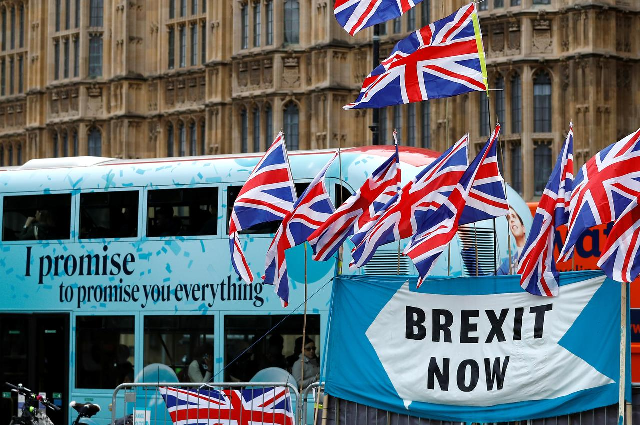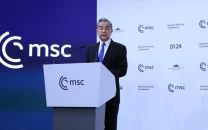Brexit breakfast for EU and UK negotiators after 'pathway to deal' opens
Both sides are silent about what compromises had been made to break the Brexit deadlock

PHOTO: Reuters
With the United Kingdom due to leave the world’s biggest trading bloc on October 31, Brexit remains deeply uncertain; it remains unclear on what terms it will leave or indeed whether it will leave at all.
In a tumultuous week, Brexit negotiations have shifted wildly, starting with a public row between London and Brussels and ending with a meeting cast as “very positive” by Irish Prime Minister Leo Varadkar.
EU chief negotiator Michel Barnier was meeting British Brexit Secretary Steve Barclay for breakfast at the EU Commission’s Berlaymont headquarters in Brussels in talks that could pave the way for a deal at an October 17-18 summit.
UK to let foreign students stay two years after graduation post-Brexit
“I think it is possible for us to come to an agreement, to have a treaty agreed, to allow the UK to leave the EU in an orderly fashion and to have that done by the end of October,” Varadkar told Irish reporters after the meeting.
In a joint statement, the two leaders said they could “see a pathway to a possible deal”, though officials on both sides were silent about what compromises - if any - had been made to break the Brexit deadlock over Ireland’s border.
To get a deal done, Johnson must tame the complexities of the Irish border before getting the approval of Europe’s biggest powers - and then sell any deal to the British parliament, which he suspended unlawfully last month and where he has no majority.
Johnson, the face of the 2016 Brexit referendum campaign, made no further comment on the meeting with Varadkar.
Ireland
Ireland is crucial if a deal is to be done to avert a potentially disorderly Brexit that would hurt global growth, roil financial markets and could perhaps even split the United Kingdom.
Dublin will have to consent to any solution to the hardest Brexit riddle of all: how to prevent the British province of Northern Ireland becoming a backdoor into the EU’s markets without having controls at the border.
UK business minister says focus is to get Brexit deal at October 17 EU summit
The Irish border has been largely invisible since British army checkpoints were taken down after a 1998 peace deal largely ended the violence between members of the region’s pro-British majority and an Irish nationalist minority.
Johnson last week proposed an all-island regulatory zone to cover all goods. Northern Ireland would leave the EU’s customs area along with the rest of the United Kingdom - and the province’s institutions would be able to opt to exit the regulatory zone - a step too far for Ireland and the EU.
It was unclear what Johnson agreed with Varadkar.
“If Barclay delivers the detail of what Johnson discussed with Varadkar yesterday, we may go into more intense talks over the weekend,” one senior EU diplomat said.
Britain’s Northern Ireland minister said that no single party in Northern Ireland would be given a veto on any Brexit deal, but that an agreement was now “a distinct possibility”.
The Democratic Unionist Party (DUP), which supports Johnson’s minority government, would have an effective veto on post-Brexit customs checks on the Irish border under proposals put forward by Johnson last week.
Education minister Gavin Williamson restated the government’s line that Britain would leave the EU on October 31, come what may, telling ITV: “We need to see the European Union shift.”



















COMMENTS
Comments are moderated and generally will be posted if they are on-topic and not abusive.
For more information, please see our Comments FAQ